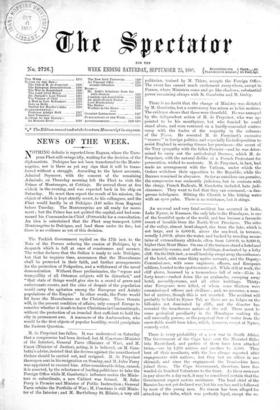There is no doubt that the change of Ministry was
dictated by M. Gambetta, but a controversy has arisen as to his motives. The evidence shows that these were threefold. He was annoyed by the independent action of M. the Freycinet, who was ap- pointed to be his mouthpiece, but who fancied he could stand alone, and even ventured on a hardly-concealed contro- versy with the leader of the majority in the columns of the Times. He resented M. de Freycinet's excessive " reserve" in foreign politics, and especially his indisposition to assist England in securing Greece her provinces—the secret of the Tory sympathy with the fallen Premier—and he was deter- mined to carry out the anti-clerical Decrees, which M. de Freycinet, with the natural dislike of a French Protestant for persecution, wished to moderate. M. de Freycinet, in fact, had made an arrangement with the Vatican, under which the Orders withdrew their opposition to the Republic, while the Decrees remained in abeyance. So far as outsiders can perceive, the compromise was eminently judicious, but in contests with the clergy, French Radicals, M. Gambetta included, hate judi- ciousness. They want to feel that they can command,—a dan- gerous indulgence. Hitting the Church is like hitting water with an open palm. There is no resistance, but it stings.


































